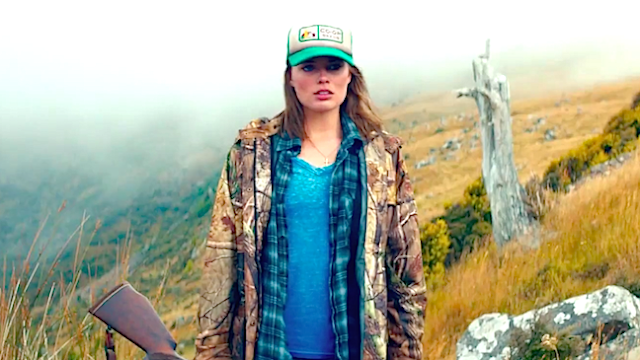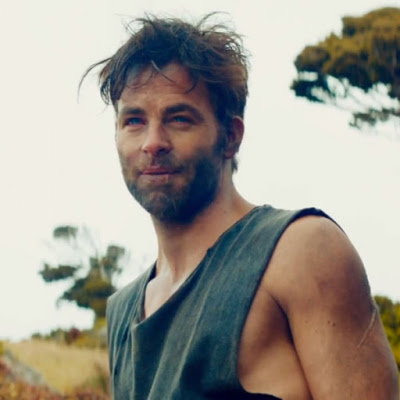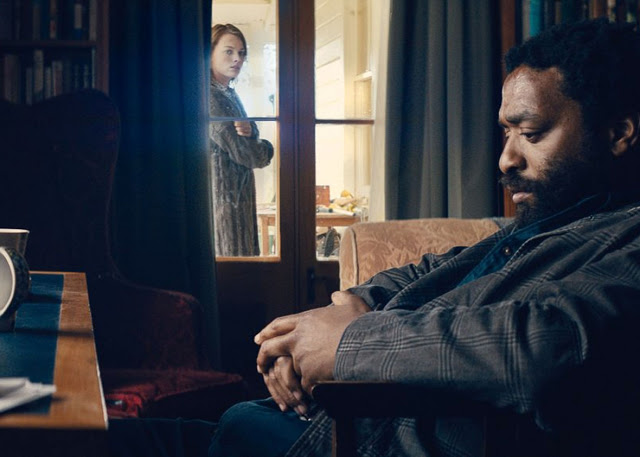The apocalypse has long fascinated filmmakers, and no wonder. From the black comedy of Dr. Strangelove to the commercial satire of Dawn of the Dead to the blunt-force survivalism of I Am Legend, the concept of the end of the world yields fertile cinematic soil for eager directors to till. But the marvel of Z for Zachariah, Craig Zobel’s solemn and soulful third feature, is that it isn’t really about the end of the world at all. Certainly, it recognizes the starkness of its reality, but it shows only the barest of interest in exploring the origins of its inciting event. (The sum total of its exposition occurs when a character muses, “Maybe something with the weather patterns.”) Instead, Z for Zachariah uses the apocalypse as scaffolding to explore a genre that is far more cataclysmic: the domestic melodrama. Zobel doesn’t care how civilization collapsed. He wants to know how hearts break.
Not that this lush and expressive film is remotely lacking in ghoulish imagery or toxic atmosphere. From its opening moments, which follow a hooded figure clad in Hazmat gear prowling through a barren landscape, Z for Zachariah silently communicates the calamity that has befallen the planet. That figure is Ann (Margot Robbie, an Australian giving her best shot at a Southern accent), the lone remaining denizen of this unhappy valley that’s located somewhere in Southern Appalachia. Ann’s hair initially appears lank and her face is caked with grime, but this isn’t one of those cheesy uglification jobs, and her natural luminescence quickly shines through because, you know, Margot Robbie. One day, this solitary looker spies John Loomis (a terrific Chiwetel Ejiofor), a civil engineer wandering a dusty road in a comically oversized “safe suit”. He futzes around with a Geiger counter and then, upon confirming that the air is uncontaminated, strips off his suit and lets out a bellow of euphoria, tears streaming down his face; with that, in less than 30 seconds and without uttering a single syllable, Ejiofor makes his character’s agony and ecstasy known. Indeed, John is so excited by having finally found a safe environment that he stupidly wades into a nearby pond without first testing the water, which is, Ann frantically informs him, radioactive.
Too late! But not really. John, an erstwhile scientist, has medicine with him, and Ann takes him to her nearby farmhouse, where she gradually nurses him back to health. From there, Z for Zachariah, which was scripted by Nissar Modi (adapting Robert C. O’Brien’s novel), proceeds on levels both pragmatic and romantic. Ann and John appear to be the last two people on Earth, and the film examines their nuts-and-bolts attempt to survive the coming winter. John, a rather brilliant fellow, devises a plan to construct a waterwheel to generate electricity for Ann’s farmhouse. That requires wood, but when John suggests dismantling the small chapel on Ann’s farm, she hesitates to destroy a house of God. You might expect such sentimentalism to infuriate a pragmatist like John, but gratifyingly, he doesn’t dismiss Ann’s concerns with scorn, and overall, Z for Zachariah (which takes its title from a series of Bible-based children’s books) is blessedly nonjudgmental about religious beliefs.
Of course, there may be another, more selfish factor motivating John’s respect for Ann’s wishes, which is where the film’s second level kicks in. Ann and John initially seem unlikely lovers—she is an insulated preacher’s daughter, he a worldly engineer—but their attraction slowly blooms, backed by the recognition that there is, after all, an entire planet to repopulate. Their courtship is bumpy, however, with their mutual attraction undercut by fear and confusion. Robbie, continuing to up her profile following The Wolf of Wall Street and Focus, does some of her best work during these tentative moments; when Ann murmurs “What did I do wrong?” after John gently rejects a hesitant advance, you want to rush to her and hug her while she weeps. But John assures her that they have plenty of time, and it seems certain that they will fortify their bonds over the coming winter, with no one who could possibly disturb them.
Then Caleb shows up.
Caleb, who is played by Chris Pine with just the right touch of mischief, is an itinerant loner whose first act, after startling Ann with his out-of-the-blue appearance, is to politely ask for a glass of water. He’s merely passing through, except that, wouldn’t you know it, he just might stay awhile. And we quickly learn that Caleb is in many ways John’s opposite. He is coarser and less learned, with a leisurely drawl and an air of nonchalance. He is also better-looking—one wonders if Zobel cast Pine because he may be the only actor in Hollywood whose eyes are as sapphire-blue as Robbie’s—a fact not lost on John, who regards him with immediate distrust. But Ann is more welcoming, inviting Caleb into her home and, more dangerously, her heart.
What follows is both predictable and rather surprising. John and Caleb make obvious romantic rivals for Ann (perhaps too obvious), and the three each form distinctive legs in one of cinema’s most rickety love triangles. Yet their competition unfolds curiously, with Caleb always appearing respectful—he refers to John as “Mr. Loomis”—and John constantly reassessing his value in Ann’s life. John is not blind to the chemistry between Ann and Caleb, but he is impotent to defuse it, and in one agonizing scene, he chokingly encourages Ann to pursue her feelings for his foil. “Y’all be white people together,” he sputters through bile, devastating Ann with his acidity but also wounding her with his assumptions. It’s an especially painful scene that confirms Ejiofor’s wondrous dexterity as an actor, but it’s also illustrative of this fragile three-headed commune, one where every member feels differently about the other two, but none can express their true feelings.
That sense of silent longing is what Z for Zachariah is really about, and it renders the looming presence of the apocalypse virtually incidental. Zobel, whose previous film, the terrifying Compliance, cemented the greatness of character actress Ann Dowd, is undeniably intrigued by how ordinary men and women respond to extraordinary situations. But his focus remains on people, not circumstances, and this movie generates its charge less from the exotic nature of its premise than from the particular qualities of its characters. That level of specificity is amplified by the film’s hushed beauty, best exemplified in Tim Orr’s striking cinematography of the valley’s verdant forests (shooting took place in New Zealand) and in Heather McIntosh’s gorgeous, delicate score. In lesser hands, Z for Zachariah might have been pejoratively labeled “handsomely mounted”, but Zobel gracefully blends the movie’s luxuriant aesthetic with its sober emotional palette, resulting in a restrained production that is also boomingly operatic.
Z for Zachariah may strain credulity at times, especially in its final act, which is powerful, provocative, and just a little bit silly. It seems somewhat ludicrous that an event as gargantuan as the apocalypse can be reduced to something as infantile as a dick-measuring contest. But perhaps that’s the point: Love will endure, along with the messes that accompany it. This movie pays tribute, with clarity and force, to the obdurate strength of human emotion. Sure, the rest of civilization may have been extinguished, but the desires of these three confused, flawed wayfarers burn on. All they want to do is ignite a small measure of happiness in their hearts. That may not sound like much, but in the cracked, dystopian universe of Z for Zachariah, it is, quite literally, the only thing in the world.
Jeremy Beck is the editor-in-chief of MovieManifesto. He watches more movies and television than he probably should.




I love apocalyptical tales (in novels, films and comics!), so I'll be looking for this one. By the way, I just read your post about While We're Young and it was great. You seem to be a bit of an expert in Noah Baumbach. Anyway, I also wrote about the film in my blog (wich I encourage you to visit):
http://www.artbyarion.blogspot.com
I hope you enjoy my review, and please feel free to leave me a comment over there or add yourself as a follower (or both), and I promise I'll reciprocate.
Cheers,
Arion.